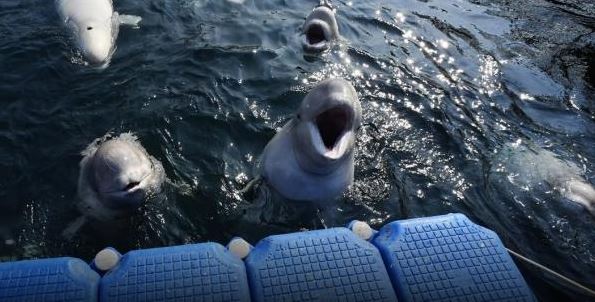
NAKHODKA, Russia, April 9, 2019 (ENS) – Officials in Russia have agreed to free almost 100 whales held in cramped sea pens in the Russian Far East for nearly a year after being caught for sale to foreign aquariums, especially in China and elsewhere in Asia.
The decision on Monday to release the 87 beluga whales and 10 orcas came after international cetacean scientists, including famous oceanographer Jean-Michel Cousteau, signed an agreement with Russian scientists and local authorities, to free the captive whales.

“A decision in principle has been taken to release all the animals into the wild,” Oleg Kozhemyako, the governor of Primorsky Region, told reporters after the signing ceremony.
But the whales’ release may not happen all at once. “Scientists from Cousteau’s team and Russian scientists will decide when and which animals to release,” Kozhemyako said.
The joint statement was signed by Kozhemyako, Cousteau, and Executive Director of The Whale Sanctuary Project Charles Vinick.
When all the captive whales are released, the so-called “Russian whale jail” will be closed. The change of heart on the part of Russian authorities comes after months of international outcry and delivery of a petition to release the captive whales with more than 1.5 million signatures on it.
The plight of the jailed whales angered animal rights groups and gave rise to a petition to release the whales, shared by actor Leonardo DiCaprio on social media.
Actress Pamela Anderson also posted an open letter to Russian President Putin on her website.
Anderson, whose great-great grandmother was from Russia, wrote, “I am truly very worried about the situation with cetaceans, with orcas and belugas, in my beloved country of Russia. For several years now, I have been trying to help the Russian government take action on this issue. I have had meetings in the Kremlin, press conferences, and open appeals to Vladimir Putin, President of the Russian Federation.”

“I have learned how cruel this trade in marine mammals can be,” wrote Anderson. “I have seen the terrifying conditions for dolphins in aquariums, and the effects that these aquariums have on their health.”
“Such unbelievably smart animals can’t be locked up in pens – their basic biological needs require them to swim and dive freely,” Anderson wrote. “It seems to me that this is so obvious and should be clear to everyone. But I understand, how difficult it is to change things that have always been done a certain way.”
“The critical situation with the whale jail in the Russian Far East, where orcas and belugas are suffering, is extraordinarily painful to see,” she wrote. “But at the same time, this can be a starting point for recovery.”
Images of the whales, kept in enclosures in a bay near the Sea of Japan port of Nakhodka, first appeared after they were caught last summer by firms which planned to sell them to marine parks or aquariums in China.
The Kremlin intervened and ordered local authorities to act, prompting Russia’s FSB security service to bring charges against four companies for breaking fishing laws.
But while the Kremlin acknowledged that the whales were being held in cruel conditions, officials said it was difficult to release them into the wild without harming them.

The Kremlin has said Russia has no direct ban on catching whales, but they can legally be caught only in specific circumstances for scientific and educational purposes.
Meanwhile, Jean-Michel Cousteau has used his blog to bring the importance of the whales to public attention.
“We have reached a point in our human evolution where people are realizing that cetaceans, including orcas and dolphins, are far too intelligent, sophisticated, and socially and behaviorally complex to be kept in concrete prisons,” he wrote.
“In captivity, they suffer from mental distress, physical illness and shorter lifespans than they would live in their natural ocean homes,” blogged Cousteau. “Sound is their primary sense used for communication, socialisation, and hunting. When confined in concrete tanks, orcas cannot fully utilise this highly evolved sense to understand the world around them.”
Kobylkin, speaking after the signing ceremony at a press conference with Cousteau, said the whales should be set free this summer. He claims they had not been freed before because it was winter.
“If we had released the animals at this period, they all would have died,” Kobylkin told reporters. “Summer is coming, and now we can, and we have to, conduct this work.”
Copyright Environment News Service (ENS) 2019. All rights reserved.
© 2019, Environment News Service. All rights reserved. Content may be quoted only with proper attribution and a direct link to the original article. Full reproduction is prohibited.
